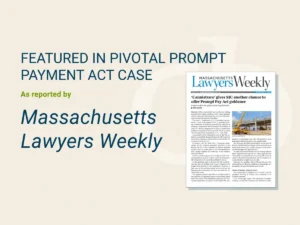Understanding Restrictive Covenants Under Massachusetts Law
Employers reply upon restrictive covenants such as non-competition, non-solicitation, and/or non-disclosure agreements to protect their confidential information, trade secrets, and goodwill. Massachusetts is one of the most employee-friendly jurisdictions relating to the enforceability of restrictive covenants. Therefore, employers conducting business in Massachusetts and employing Massachusetts residents must be acutely aware of the limitations they face when first asking employees to enter into certain restrictive covenants and then when enforcing those agreements.
Key Takeaways
- Non-competition agreements are legal in Massachusetts. However, their enforceability is limited by statute, and employers must strictly comply with those statutory requirements.
- Employers have more flexibility with respect to non-solicitation and non-disclosure agreements.
- All restrictive covenants must be narrowly tailored and reasonable in length, geography, and scope.
- Employers must balance the costs to enforce restrictive covenants with the damages and losses they may incur without such agreements in place.
Non-Competition Agreements under Massachusetts Law
A non-competition agreement places limitations on the types of work and specific industries or employers with whom an employee may work after separation from their current employer. In Massachusetts, non-competition agreements entered into with employees after October 1, 2018 must comply with the strict requirements of Mass. Gen. Laws ch. 149, § 24L. To be enforceable, non-competition agreements must:
- be in writing and executed by both the employer and the employee;
- inform the employee that they have the right to consult with an attorney prior to signing
- be presented to the employee by the earlier of:
- formal offer of employment; OR
- 10 business days before the employee’s first date of employment
- must protect an employer’s trade secrets, confidential information, or goodwill;
- be in place for no more than one (1) year after the end of the employment relationship
- limited only to the geographic areas in which the employee had a material presence
- limited to the specific types of services the employee provided during the 2 years
preceding the end of the employment relationship
Massachusetts courts have issued decisions finding that a failure to comply with one or multiple statutory provisions suffices to make the entire non-competition agreement unenforceable.
Non-competition agreements entered into before October 1, 2018 remain enforceable and are not subject to these statutory requirements. With this said, they must still be narrowly tailored and reasonable in geographic scope, duration, and scope of services.
Employers Must Provide Certain Consideration to Employees for Their Agreement to a Non-Competition Agreement.
Like any contract, non-competition agreements require employers to provide a benefit to employees for their acceptance of the non-competition restrictive covenant. The nature of the benefit (known as consideration) depends on when the employer presents the non-competition agreement to the employee.
For new employees, employers must provide “garden-leave” consideration or “other mutually-agreed upon consideration.” The consideration must be specifically set forth in the agreement and must be provided in exchange for the non-competition promise. The “garden leave” provision must pay employees at least 50% of their base salary for the duration of the non-competition period. As for “mutually-agreed upon consideration,” the statute does define this term. Employers are encouraged to offer employees reasonable consideration in relation to the employee’s wages and the extent of the non-competition period if they do not institute a “garden-leave” provision to best support enforceability of the agreement in the future.
For current employees, employers can still offer non-competition agreements. However, continuous employment is not considered sufficient consideration for the employee’s promise. Rather, employers must provide “fair and reasonable consideration.” Again, the statute does not define this phrase. This could include monetary payment, increased benefits, or other forms of payment. However, employers should again error on the side of making meaningful payments to support enforceability. In addition, employers must provide existing employees with at least 10 business days to review the agreement before it becomes effective.
Options for Employers Who Do Not Want to Incur the Costs and Risks Associated with Non-Competition Agreements
Given the requirements and costs that employers face with non-competition agreements, employers may want to consider alternative restrictive covenants that can also protect their legitimate business interests with fewer requirements.
Non-Solicitation Agreements: Employers may restrict a former employee’s right to solicit, induce, or take an employer’s remaining employees, customers, and prospective customers. Carefully drafted non-solicitation agreements can satisfy employer needs without the statutory restrictions. They must still be narrowly tailored and reasonable, but non-solicitation agreements do not require the same formalities as non-competition agreements.
Non-Disclosure Agreements: Similarly, employers can protect their trade secrets, intellectual property, and confidential / proprietary information via non-disclosure agreements. When employers take the time to carefully define their “confidential information,” these agreements can be extremely useful in protecting company interests during the employment relationship and after separation.
Employers should carefully review their business needs and customize restrictive covenants to best fit with their mission and interests. They should not rely upon boilerplate templates. What works well in the construction industry may not be enforceable or appropriate in the healthcare industry. Employers must be aware of their particular needs and the costs they may incur.
Non-Competition Agreements Are Not Permitted for All Employees
Under Massachusetts law, employers cannot enforce non-competition agreements for overtime, non-exempt employees, employees younger than 18 years old, or employees who were laid off or terminated without cause. With that said, non-solicitation and non-disclosure agreements are enforceable for these types of employees.
Further, other Massachusetts laws prohibit non-competition agreements for certain professions such as physicians, nurses, attorneys, psychologists, social workers, and members of the broadcasting industry.
Important Consideration for Out-of-State Employers
The Massachusetts non-competition law likely applies to out-of-state employers employing Massachusetts residents. Specifically, the statute overrides any contractual choice of law provision that voids Massachusetts’ non-competition requirements when the employee has resided or worked in Massachusetts for at least 30 days immediately preceding the end of their employment relationship. Therefore, out-of-state employers must pay particular attention to their non-competition agreements and understand the reach of Massachusetts law in this area.
This provision of the law has not yet been addressed by the courts in a published decision and, therefore, its enforceability remains a question.
Cole Law Partners Can Help
For good reason, employers want to protect their business interests. To do this lawfully in Massachusetts, however, employers must understand the distinction among different types of restrictive covenants and the requirements with which they must comply for those covenants to be enforceable. Employers who blindly enter into these types of agreements risk not only litigation costs, but also the real potential that their trade secrets, confidential information, and goodwill may not be protected as they intended. Cole Law Partners’ employment lawyers understand and regularly counsel clients regarding the nuances of Massachusetts’ restrictive covenant law. We are prepared to partner with employers to draft and implement enforceable covenants and agreements and navigate potential risks. Employers with questions or concerns should contact us to discuss further.




